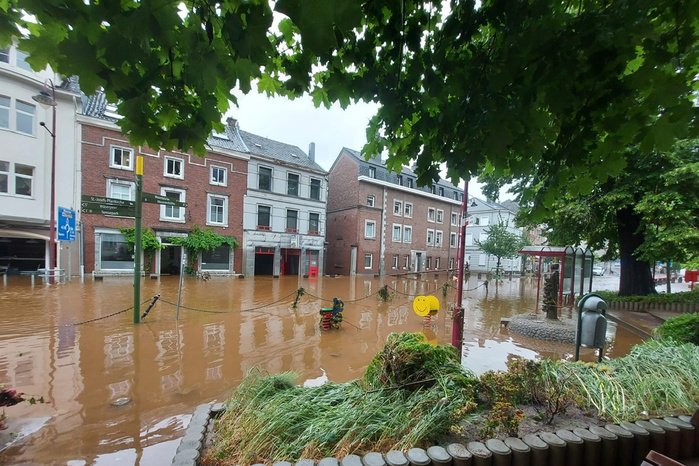Politicians have been warned by climatologists for decades that natural disasters such as the floods Belgium experienced last week would become a reality but failed to act on these warnings, according to climate scientist Jean-Pascal van Ypersele.
Despite being saddened by the floods, and being taken aback by the scale and intensity, they did not come as a surprise for van Ypersele, former vice-president of the UN climate panel (IPCC).
"We cannot predict individual disasters, but we (the IPCC) knew that the risk was increasing. Politicians did not take responsibility in time," van Ypersele said in VRT's Terzake.
Van Ypersele added that the floods fell in line with predictions made in a report by the IPCC, which stated that global warming will intensify the two extreme sides of the water cycle, meaning there will be more abundant rainfall and more severe drought.
"In our study on climate change in Belgium, we wrote in 2004 that we must prepare for much more intense rainfall. It is endlessly painful and frustrating that our conclusions have not led to sufficient action, because this is about a lot of suffering," van Ypersele told De Morgen.
Related News
- King praises aid workers and volunteers in National Day speech
- Flood-hit areas could now face spread of infectious diseases
- Walloon government frees initial €2 billion for reconstruction after floods
He explained that climate change will trigger warmer and drier summers in Belgium, but that this is expected to go hand in hand with heavy rain in higher concentrations.
Hanne Glas of UGent's Geography department mirrored the statement that these periods of heavy rainfall recur more often in Belgium in the future.
"Of course, what we are experiencing now is extreme and exceptional, but it is true that climate change is leading to more intense and concentrated precipitation," she told Radio 1.
She explained that when these happen in the summer, it becomes more of a problem, as the hard ground can't absorb the excess water as quickly.
Van Ypersele added that no climatologist claims that only global warming causes flooding, but he stressed that the pattern of weather record after weather record being broken "is a reality that cannot be explained without climate disruption."
Policy problems and preparing
The problem, in part, comes down to climate change, which according to van Ypersele, the government has ignored, both in its policy-making and in its preparation for such disasters.
He added that the European Green Deal, a series of policy initiatives from the European Commission which recently became law under the Climate Law, is not enough to prevent this from happening again and more frequently in the future.
"It is good to have European targets, but ambitious measures are even more important. My fear is that it will take years before they are enacted in the law of member states and that the final policy will be a watered-down version," he said.
"More responsibility must go to those who pollute. This is also a collective responsibility. Europe is only part of the world," van Ypersele added.
He argued that the government in the meantime is not doing enough to adapt infrastructure and buildings to cope with more flooding.
Glas added that, at the moment, victims "can do little more than lay sandbags to limit the damage," but stressed that this is merely a plaster on the wound.
"In the future, structural measures must be taken. We need to map out the risks, which houses, which streets and which meadows are at risk and how can we start protecting them?" she added.
She argued that, rather than investing in dykes "which ensure that water is drained off faster, but can cause problems for lower-lying areas," the government should think of water-saving basins and similar systems.
"That way, we can buffer the water and let it seep into the ground. That's good for the groundwater level," she explained.

